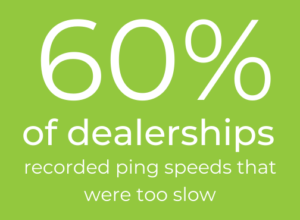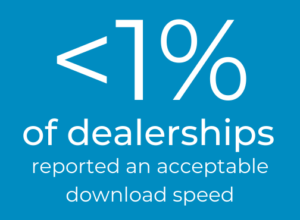In 2019, a South Florida dealership group was hit by a ransomware attack that halted operations for three days and resulted in a quantifiable $500,000 loss for the group. That number only speaks to the physical cost of replacing every computer throughout the five-rooftop group along with the lost revenue while systems were down for investigation and remediation of the incident. The lost long-term revenue due to damaged reputation has yet to be calculated but will be substantial and will linger for years.
We know as dealers you are very aware of your competitors and the tools and tricks they are employing to take and gain market share from you. You see their commercials, you hear them on the radio, you probably even shop their website regularly to make sure you are staying one step ahead.
While the dealership across town is trying to chip away at your business, the bigger threat is a silent enemy working in the shadows. This enemy is looking to completely cripple your operations and take away a big score in an instant just as they did to the dealership mentioned above. This silent foe of your business is the cybercriminal, or more accurately, cybercriminals.
24 hours a day, seven days a week, in all corners of the world, there are hackers working diligently to find or create exploits in the cyber defenses of businesses for financial gain. Automotive dealerships are a prime target because of the high volumes of valuable data like personal identifiable information and payment records you collect and store.
Automaker Kia Motors America was recently crippled for days by “an extended system outage” that investigative reporting strongly suggests was a ransomware attack demanding at least $20 million in bitcoin to allow systems to return to normal operation and prevent sensitive customer data from being sold online.
You may think you are doing all you can do to keep your dealership from falling victim to cybercrime, but if an OEM with all their resources and safeguards in place is susceptible, how do you think your dealership stands? A Total Dealer Compliance survey revealed only 30% of dealerships employ IT professionals who have completed security training and certification. The other 70% are just hoping they keep reading about “the other guys” falling victim.
The reality is you are way more vulnerable than you think. The bigger reality is that as long as the majority of dealerships treat IT as a cost to be managed as opposed to a vital component of successful operations you are actually inviting this sort of attack. Cybercriminals will uncover the opportunity and they will not hesitate to strike.
It is vital to have a proven strategy in place to protect your business. Nefarious actors employ every tactic from actual physical entry into your facility to a seemingly harmless email to obtain the information they are after. Over our next several articles we will share our expertise on the various methods cybercriminals utilize to achieve their means and how you can protect yourself against them.
The first thing you have to do is stay vigilant. You and your staff must pay as much, if not more, attention to the enemy silently coming hard to injure your business with one big blow as you do to the competitor down the street trying to take your customers away one oil change at a time.
January 4, 2021
Ping is the Thing: Speed Up Your Business
If we have only demonstrated one thing in reporting on our first-of-its-kind nationwide dealership network speed survey, it is that providing an excellent internet experience for your customers and staff is complicated. It seems simple enough to reach out to your local internet service provider and order the fastest bandwidth and call it a day, but if that were the case, we would have seen much more promising results.

Many factors beyond upload and download speed affect the performance of your network. One data point we investigated, ping speed, also known as latency, is a valuable diagnostic tool that demonstrates both network speed and capacity by measuring the time it takes for a piece of data to travel to a point and back. Nearly 60% of all dealership ping speeds tested below the acceptable 20ms threshold. There could be many reasons for this, but it is generally something that can be addressed with a managed network.
Fast internet is one thing, but capacity is what really matters. If multiple users are demanding internet at the same time, your connection, no matter how potentially fast, will appear slow.
A real-world comparison would be to think of a highway. The speed limit is 70 miles per hour. Under ideal conditions you can travel at that rate. However, in rush hour there are multiple other vehicles on that same highway with you. The demand causes congestion, which prevents you from reaching top speed. You can only move as fast as the cars in front of you. This would be a case of demand causing high latency.
How does this apply to your network and how can it be corrected?
If there is a demand issue, configurations can be made on the network where business traffic takes priority over a customer streaming in the client lounge. Done correctly this would still feel seamless to your guests maintaining a great experience.
We now live in an instant gratification world where even the slightest delays frustrate customers and create negative experiences. If you are slow to respond to an online customer’s inquiry because you did not receive it in a timely manner, they are likely to simply move on.
If your service waiting customer is frustrated by the Wi-Fi in your lounge, they may consider taking their vehicle somewhere else to be serviced next time simply because of the guest internet experience.
If you tell a service customer, who dropped off their vehicle, you are sending them a video and it takes too long for them to receive it, your service department loses credibility and the upsell, or even service their vehicle needs, may be declined out of frustration.
You may or may not actually have control over the amount of bandwidth available to your dealership from an internet service provider, but you do have control over the experience your guests have on your network. Understanding ping speeds and how they affect the overall customer experience and ultimately impact your business is crucial. Click here to test your network speed and get a clear picture of the ping speeds on your network. If you are concerned with the results, fill out the form on the page and ask DealerIT’s network experts to perform a complimentary dealership analysis.
November 30, 2020
Upload Speed Should Not Be Your Competitor
With the surprisingly poor results uncovered by our first-of-its-kind nationwide dealership network speed survey we have been receiving many questions from dealers wondering how their network shapes up and why it matters. The most common question is, “in terms of my network speed, which measurement is most important, upload, download or ping?”
The answer is there is no way to decide this because poor performance in any of these areas affects your business in different ways. However, it could be argued that upload speed, where 60% of dealerships underperformed, carries the greatest weight because it directly impacts the speed you are able to communicate with customers who are still deciding whether to buy at your dealership or another in the market.
For obvious reasons, digital retailing is all the rage. The tools necessary to do it well are all about convenience and efficiency. In-market car shoppers are devoting their precious time to find the right vehicle then ultimately determine their price and select the dealership that can provide those specifications for them.
In a world where information is readily available and convenience is key, if you are a second too late in sending a vital message to your customer, you may have lost a sale as they move on from your website, or worse, your salesperson, to another.
Consider everything you are doing now to provide the best information and interactions for your customer. Taking multiple pictures of every vehicle in your inventory, loading walkaround videos, even your service team is (or should be) sending videos to customers letting them know of issues with their vehicle that need to be addressed.
What about the customer who is basically ready to buy and just wants your salesperson to work with them on a video call for a final walkaround or to get their last few questions answered?
All of this is data is competing for resources on your network.
If every vehicle you have in inventory is not up on your website when a prospect visits, they may not come back. If they experience a choppy sales call, that could reflect poorly on the quality of your dealership and encourage them to look elsewhere. You are only going to hold a service customer’s attention for so long, trying to show them what’s wrong with their vehicle over a shaky, interrupted connection in the middle of their busy day makes a convenience offering a huge inconvenience in a hurry.
More of these tools are being made available every day and customer expectations are rising at the same rate. If your dealership is running into issues with upload speed now, they are only going to get worse.
Network speed and performance improvement in terms of upload speed, download speed and ping must be addressed holistically. Improvement in one area will lead directly to improvement in the other two. Download speed, which we wrote about in our last article, tends to impact those in your dealership, while upload speed most greatly impacts potential buyers. This factor must be considered as you measure the effectiveness of your overall network and determine the importance in driving customers down your sales funnel from online car shoppers to in-dealership car buyers.
Find out if your dealership’s network is where it needs to be. Click here to take a network speed test, then fill out our form for a COMPLIMENTARY technology assessment from DealerIT.
November 2, 2020
Your Download Speed is Letting Your Dealership Down
In our landmark study of dealership network speeds, the findings were alarming to say the least. Perhaps most alarming of all were the slow download speeds we uncovered. It was not an isolated problem. It was true of – literally – 99% of the dealerships in our study.
You read that right. Only 1% of dealerships had an adequate download speed of 100Mbps or higher. That equates to 6 of the 1,132 dealership networks we tested.
Why does this matter? To answer that question, we need to understand what the term means. Download speed is essentially the speed at which information from the internet is transferred to your computer. When you equate speed to time, a quicker download means time saved while a slower one equals time lost.
That is why download speeds are important.
In 20 years of working with dealerships, slow internet has been one of the most common pain points we uncover. There is nothing more frustrating than waiting for a resource to provide the information you need. Home internet speeds have become exponentially faster over the years creating higher expectations for your business network.
When Netflix streams faster than your sales summary report downloads, this creates frustration for your team. When customers in your lounge can not stream content to minimize their perceived wait time, this creates frustration for them. Regardless of the need and who is pulling data, the result is a negative experience. This eventually leads to declining morale and turnover of staff and customers alike. Have you ever considered these costs of slow internet?
These are just a couple of examples. Every tool you add to improve your sales process, or create an amenity for your customer, or provide a better, more informative service experience is placing more demand on your network. As the car business evolves, even as cars evolve, this is a problem that is only going to get worse, not better.
So, what’s the solution? More bandwidth? Not necessarily. This will definitely add cost, but it will not necessarily add speed.
It is more likely you have a network design problem, or a piece of aged equipment that is creating a bottleneck. The root cause can be challenging to diagnose if you are not partnered with professionals who are invested in the success of your business. You owe it to your dealership, your staff and your customers to provide the most efficient experience possible.
You should be adding tools to increase productivity and improve customer interactions within your dealership, but if your download speeds are inadequate to do so, you will only be increasing frustration. Don’t let your download speeds create a downward spiral, click here to see if you’re dealership is equipped to keep up with increasing pace of automotive retail technology.
We are excited to cover this and other pertinent topics at the upcoming Automotive Analytics & Attribution Summit (AAAS) in our workshop, “Why Would You Call a Plumber to Fix Your Technology Problems” and also in the Brian Pasch Podcast. Please click here to learn more about AAAS and find out how you can attend the virtual event this year.
October 5, 2020
Nationwide Study Reveals Dealership Networks Are Too Slow
Today DealerIT is releasing the results of a first-of-its-kind survey of network speeds in retail automotive dealerships conducted in July 2020. Utilizing more than 2,200 testing devices across 1,132 unique sites, DealerIT directed each to perform a network speed test at specified times to paint a fully detailed picture of network performance under multiple circumstances.
This study was conducted because today’s dealerships rely on bandwidth and a reliable network infrastructure in order to sell and service automobiles more than they ever have. With salespeople utilizing video walkarounds and using Facetime to interact with their customers and dealerships relying on CRM and digital retailing tools, internet speed has become vitally important. Even service writers and technicians are taxing dealership networks with virtual communication and video solutions. Dealership bandwidth issues will be even more amplified as the connected car becomes more prominent.
The results of this nationwide test consistently demonstrate that most dealerships studied do not possess a network capable of achieving speed that is sufficient to adequately support the customer-facing and internal technology tools required to conduct business in today’s connected climate.
This determination is achieved using three key measurements (defined below) – upload speed, ping and download speed – with a minimum acceptable threshold determined for each based on DealerIT’s understanding of the complex interdependencies of a dealership network.
The results represent the average of tests conducted three times daily on Monday, Wednesday, Friday and Saturday of a given week. To ensure results were not skewed by specific events (like a month-end closeout) a week in the middle of the month was selected. Neither the day of the week or the time of day produced significant variation in the outcome of the testing. Speeds were consistently poor.

In terms of upload speed, 59% of all dealerships measured below the “good” mark of 50 Megabits per second. Ping speeds, determined to be adequate at 20ms or less, were even more concerning with barely 40% of all dealerships meeting or exceeding the benchmark. Download speed was most alarming. Less than 1% of all tested networks (only 6 dealerships) achieved a desired speed of 100 Megabits per second or higher.
Compare this to the speed of your network at home. Would you tolerate a slow, choppy connection while you’re binging Netflix? Of course not. Then how is a slow connection acceptable for your business?
What is upload speed?
Upload speed is the speed that a given device on your network can transfer or send information to the network. Think of all the data you transmit. Credit applications, deal data to your cloud based DMS, and now those video walkarounds you are sending sales and service customers. When your upload speeds are slow, you are making someone wait. Waiting creates a negative customer experience.
What is download speed?
Download speed is the speed that information on the internet is transferred to your computer. Watching a virtual auction to get the perfect pre-owned car for your market? Your download speed could cause you to miss your chance to bid. Working with your finance partner to discuss add-on options and pulling information from their website? Pulling a report from your DMS? If these daily tasks are frustratingly slow, it’s more likely your network download speed than the resource you are working with.
What is ping?
Ping is a measurement of how long a small data packet from your computer takes to reach a destination on the internet and come back. Sometimes referred to as latency, this test can be considered a practical example of the combined impact of your upload and download speeds. The speed of anything you do on the internet is impacted by your ping speed. If a website is slow to load or an email takes forever to send, your ping speed is out of line illustrating the degree to which your overall network performance is taxed by all of the other activity occurring on it.
How’s your network?
The data suggests your dealership network is not nearly as fast as it needs to be. Remember, more stress is being placed on it every day. Every technology tool you are adding to improve the customer experience and simplify your team’s workflows and processes is likely having the opposite effect. How often have you said, “this website is so slow” or “It takes forever to do anything in our CRM.”? In most cases, we blame the technology provider when a resource is not working properly but it may not be their fault. If the foundation of your dealership internet speed and network infrastructure is not solid, it’s like building a house in the sand.
With less than 1% of all dealers utilizing networks that are fast enough to support their operations, there is obviously a lot of shaky technology infrastructure out there. To see how your network measures up and receive more information on how your dealership’s network performs, click here.
Post a Comment
You must be logged in to post a comment.








